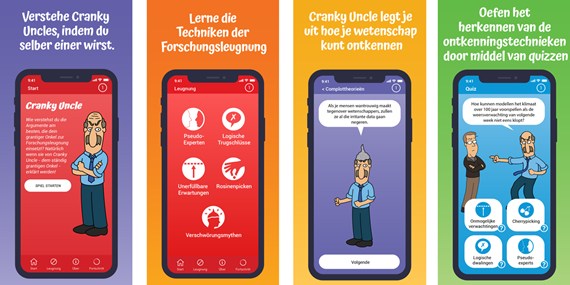
We have just launched v2.0 of the Cranky Uncle game - a multilingual version. The first two languages available are Dutch and German!
It’s been a long journey to this point. We ran our initial crowd-funding campaign back in January 2020 and thanks to generous donors, we worked with creative agency Goodbeast to develop and launch v1.0 of the game in December 2020. Our next goal was always to develop a multilingual version of the Cranky Uncle game and thanks to some additional funding support from Monash University, Cranky Uncle is now able to teach you how to identify the science denial techniques in Dutch and German!

With the game currently being translated into a number of other languages, we hope to see a lot more dots on this map soon of educators signing up for a group code from Europe. It’s actually quite amazing to see this many dots already outside of English speaking countries even though the game has only been available in English for a year:
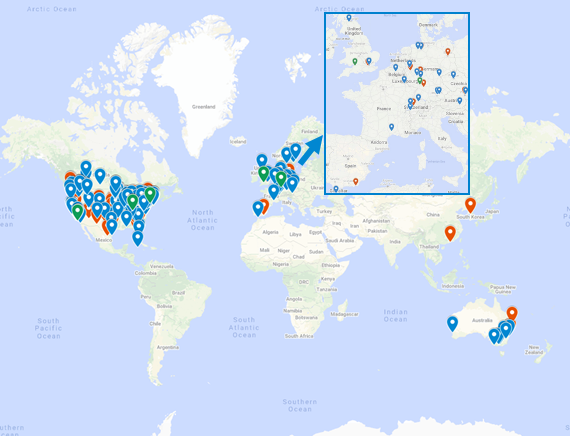
The Cranky Uncle game adopts an active inoculation approach, where a Cranky Uncle cartoon character mentors players to learn the techniques of science denial. Cranky Uncle is a free game available on smartphones for iPhone (sks.to/crankyiphone) and Android (sks.to/crankyandroid) as well as web browsers (sks.to/crankybrowser). The player’s aim is to become a “cranky uncle”—a science denier who skillfully applies a variety of logically flawed argumentation techniques to reject the conclusions of the scientific community. By adopting the mindset of a cranky uncle, the player develops a deeper understanding of science denial techniques, thus acquiring the knowledge to resist misleading persuasion attempts in the future. More information about the game and its scientific background is available in the article “Teaching students how to spot climate misinformation using a cartoon game” published in the journal Plus Lucis.
Since the game’s release in December 2020, John Cook has made several resources readily available for educators and anybody interested in exploring how the game can be used to teach critical thinking. These resources have been compiled in a blog post and at least some of them will also be translated into other languages. The central resource is the “Teachers’ Guide to Cranky Uncle” which is now available in English, German and Dutch:
|
English |
German |
Dutch |
In addition to necessary updates of the game’s code base tackled by creative agency Goodbeast (formerly Autonomy), we also had to translate all of the content, a task coordinated by Bärbel who also tackled the German translation. In July 2021, we put out a call for help with the translations and we soon had several teams working on translations into many languages. Nienke joined the effort early on for translations into Dutch so we decided to move ahead with both German and Dutch as the initial languages of the multi-lingual V2 of the Cranky Uncle game.
If you’ve played the Cranky Uncle game already, you’ll know that there is quite a lot of text– which all needed to be translated. All told, there were over 2,000 terms, questions, answers and whole paragraphs in need of translation - per language! The translation teams collaborate in Google sheets to create and proofread their translations. Once done, all of that content needs to be - manually - copied from the sheet into the content management system (CMS) Strapi, a not really fun, but necessary task requiring dozens of hours of work. And in case you are wondering: yes, we entertained the thought of finding a way to import the translations into Strapi but figured that setting this up and then testing it to make sure it worked would take longer than doing it the hard way.
We had to solve some creative translation tasks which made this quite an interesting activity. Here are a few examples of what we termed “tricky to translate content”.
To begin with, translators had to come up with 35 moody terms fitting for a Cranky Uncle getting ever crankier as players reach a new level in the game. John had come up with a list of 35 English terms and it proved to be more difficult than expected for some languages to a) come up with that many terms and b) somehow rank them from not all that cranky to exceptionally cranky! Don’t believe us? Give it a try yourself!
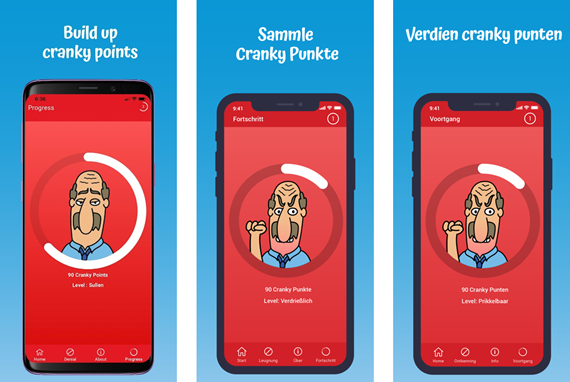
But compared to some other head-scratchers this was quite an easy task, solvable with the help of online dictionaries and thesauruses! Working through the different texts in need of translation we soon had a “nice” list of questions to be discussed:
Some fallacies didn’t have a 1:1 translation but used a different term requiring a new icon. A prime example for this is “cherry picking” in English which is raisin picking in German. Or “red herring” in English which is a “false trail” in German. Luckily enough, these mis-matches had already come up earlier so John had already created alternative icons for both, which we could use as replacements in the game.
![]()
The really hard to resolve issues were those related to the ‘Ambiguity’ fallacy where one word has different meanings for scientists and lay people which then gets exploited by science deniers. Not all are as easy as the word “theory” which translates 1:1 into other languages and also has the same meaning scientifically on the one hand and in everyday language on the other.
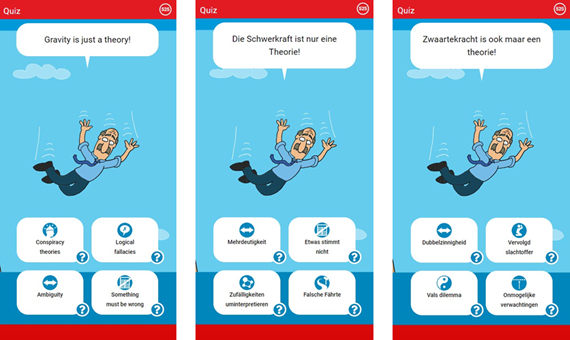
But, look at this example from the English version of the game where the quiz displays a dog:
“Trees have bark and I bark. So I must be a tree!”
Run this through a translator and you get this for German:
"Bäume haben eine Rinde und ich belle. Also muss ich ein Baum sein!"
…and this for Dutch:
“Bomen hebben schors en ik blaf, dus ik moet een boom zijn“
This loses the ambiguity present in the English text with the word “bark” because “Rinde” and “belle” are two obviously completely different words in German as are “schors” and “blaf” in Dutch. So, the question was whether we could come up with good alternatives in German and Dutch which then also fitted the cartoon dog. After some back-and-forth and on the brink of discarding the quiz question completely for the translated version of the game, Bärbel and Nienke came up with suggestions which turned out to work:
For German:
“Knecht Ruprecht hat eine Rute und ich habe eine Rute. Also muss ich Knecht Ruprecht sein!” (This translates back to “Knecht Ruprecht [he’s accompanying Santa Claus in Germany] has a rod and I have a tail. So I must be Knecht Ruprecht!”)
For Dutch:
"Een graaf is van adel, ik graaf. Dus ik moet van adel zijn!" (This translates back to “A "count/earl" is of nobility, I "dig". So I must be of nobility!”)
Problem solved for both German and Dutch!
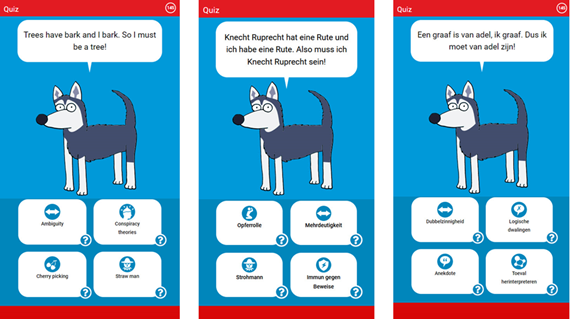
The game is freely available on iPhones, Androids, and browsers via the links below where you can then select one of the available languages to play it in. If you already played V1 of the game in English on your device, you'll need to start from scratch by first deleting your account in the settings and then selecting another language. The browser version looks best if you resize the screen to mimic a smartphone in portrait mode.
| iPhone | https://sks.to/crankyiphone |
| Android | https://sks.to/crankyandroid |
| Browser | https://sks.to/crankybrowser |
If you’d like to provide feedback about the Cranky Uncle game, please fill out this short Google form.
Happy playing and getting ever crankier!
Translating and testing the multilingual version of the game wouldn't have been possible without the support from Kurt Roberts, Jay McDowell, Meg Martin (and others at Goodbeast), Bärbel Winkler, Thomas Schubatzky, Silke Schäfer, Gabi Waldhof (German translations), Nienke de Haan (Dutch translation, testing and additional graphics) and of course John Cook. Thanks much to everybody!
Even though the translations of the Cranky Uncle game are done by teams of volunteers, each language incurs costs for programming activities to get a language set up in the game. If you'd like to support Cranky Uncle "teaching" his science denial techniques in other languages, please use the dedicated form provided by Little Green Light (LGL) to contribute.
Posted by John Cook on Wednesday, 2 February, 2022
 |
The Skeptical Science website by Skeptical Science is licensed under a Creative Commons Attribution 3.0 Unported License. |